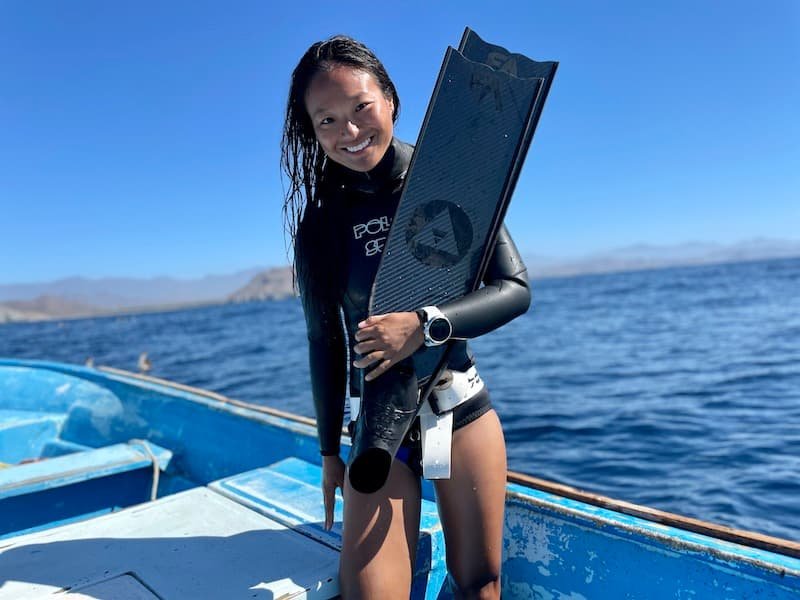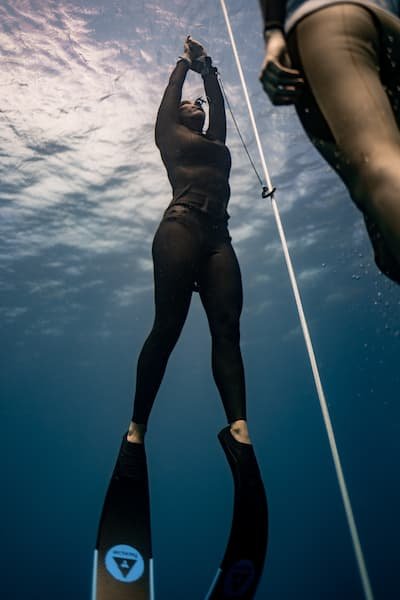
 Nick Pelios
Freediver, Creator
Nick Pelios
Freediver, Creator

 Nick Pelios
Freediver, Creator
Nick Pelios
Freediver, Creator
Freedivers often encounter the challenge of sustaining their skills and physical fitness consistently, particularly when they lack regular access to deep waters. For individuals residing far from the coast or in regions with predominantly shallow waters, the prospect of engaging in deep freediving becomes a rare and treasured occasion. Nevertheless, acclimating to the profound pressures associated with deep diving necessitates a methodical and gradual approach.
Many freedivers find themselves ensnared in a recurring pattern: a brief sojourn to a deep-diving destination, a gradual buildup to their maximum depth, and just as they reach their peak performance, it's time to bid farewell and return home. This prompts the crucial question of how one can sustain optimal physical and mental condition throughout the year, ensuring a swift return to their maximum depth when the opportunity arises once again. Presented below are three foolproof tips to aid in achieving this goal.
Mastering the equalization of ears poses a significant challenge in the realm of deep freediving. Progression in this aspect often becomes a stumbling block for many divers and necessitates substantial time investment for training and overcoming equalization constraints. A noteworthy technique employed in this pursuit is BTV, or Béance Tubaire Volontaire, which translates to voluntary tubular opening. BTV involves the intentional opening of the Eustachian tubes through the controlled manipulation of surrounding muscles, enabling hands-free equalization.
Diligent practitioners can engage in a series of exercises within the comfort of their homes, utilizing mirrors over an extended period to stretch, fortify, and enhance awareness and control of the muscles encompassing the Eustachian tubes. While these exercises may not immediately lead to the capability of hands-free equalization underwater, they undeniably contribute to easing and refining the regular equalization process.
Freedivers commonly resort to the Frenzel and/or Mouthfill techniques for equalizing their middle ears during deep dives. These techniques demand a heightened level of awareness and control over the tongue, jaw, soft palate, and glottis. To effectively hone these skills, numerous exercises can be executed on land or in shallow water. Seeking guidance from a qualified instructor is advisable, as they can elucidate and demonstrate the exercises, provide feedback on performance, and rectify errors. Additionally, investing in specialized tools like an otovent or an EQ-Tool proves worthwhile, augmenting the effectiveness of equalization practice.

Engaging in Free Residual Capacity (FRC) dives and empty lungs dives serves as a highly effective method for training various aspects of deep dives, all within the confines of shallow waters. This approach involves exhaling a portion of air before initiating a dive, expediting the reaching of your lungs' residual volume. This technique allows for a comprehensive training experience, encompassing the simulation of lungs and chest compression, honing body position and relaxation during freefall, and refining equalization skills, all while maintaining shallower depths.
The deliberate exhalation before a dive mirrors the conditions of a deep dive, enabling freedivers to acclimate their bodies and minds to the pressure and physiological changes associated with such descents. The advantage of conducting these dives in shallower waters lies in alleviating mental pressure, affording divers the opportunity to focus exclusively on technique and sensations. Moreover, the nature of shallow depths permits the repetition of multiple dives within a single session, a feat not achievable with deep full-lung dives.
It is essential to underscore that FRC and empty lungs dives are advanced techniques, and it is strongly recommended to attempt them under the guidance of a qualified instructor. Maintaining a keen awareness of sensations during these dives is paramount. If at any point relaxation is compromised, or there is discomfort or difficulty in equalization, it is imperative never to push beyond one's limits. Prioritizing safety and careful monitoring of one's physical response ensures a productive and secure training environment.

Freediving, as a sport, places significant emphasis on mental strength, particularly when venturing into the depths of deep diving. The psychological demands of this activity necessitate a mind that is not only strong and confident but also relaxed, focused, and tranquil. These mental attributes crucially contribute to a freediver's success and safety during underwater exploration. Fortunately, cultivating these qualities doesn't always require delving into the depths; various mental training methods can be employed to enhance one's psychological preparedness.
Visualization emerges as a remarkably potent tool, widely utilized by top athletes across diverse sports. The intricacies of the human mind, while complex, exhibit a fascinating susceptibility to suggestion. The mind, in its peculiar way, tends to accept and believe whatever information is presented to it. This characteristic forms the basis of the effectiveness of visualization techniques. Notably, individuals recovering from injuries have demonstrated accelerated healing and minimized muscle loss when engaging in mental imagery exercises such as envisioning themselves running or exercising.
In the realm of freediving, visualization proves equally impactful. Imagining oneself executing a deep dive serves as a powerful preparatory exercise for the actual underwater experience. Visualization techniques come in various forms, ranging from detailed, extended visualizations to real-time simulations that closely mimic the duration of a real dive. Problem-solving visualizations also play a role, helping freedivers anticipate and mentally rehearse responses to potential challenges during a dive.
The key to successful visualization lies in making the mental imagery as realistic as possible. Engaging all senses and immersing oneself in the imagined scenario contribute to creating an experience that the brain perceives as genuine. By evoking a lifelike setting within the mind, freedivers can effectively enhance their mental fortitude and readiness for the challenges that await them in the depths.